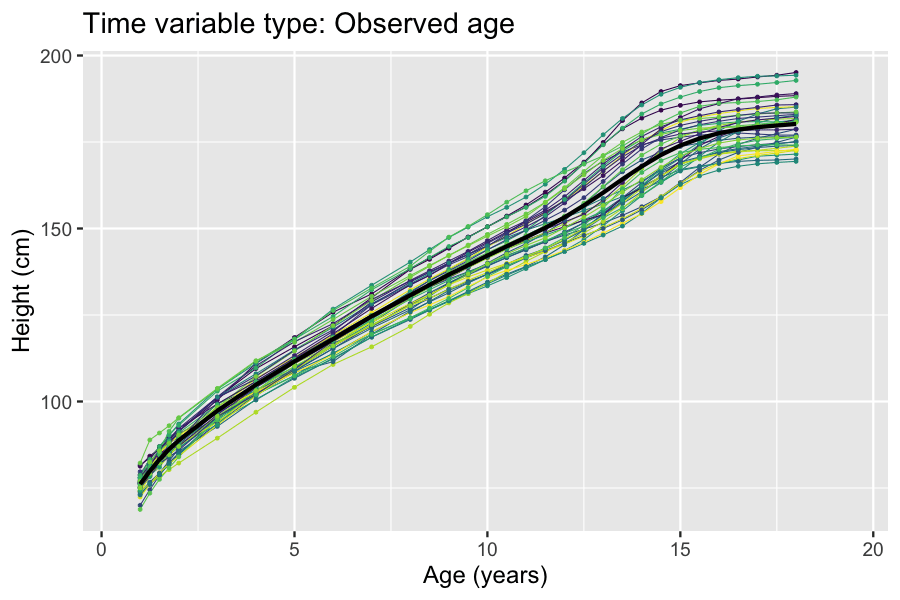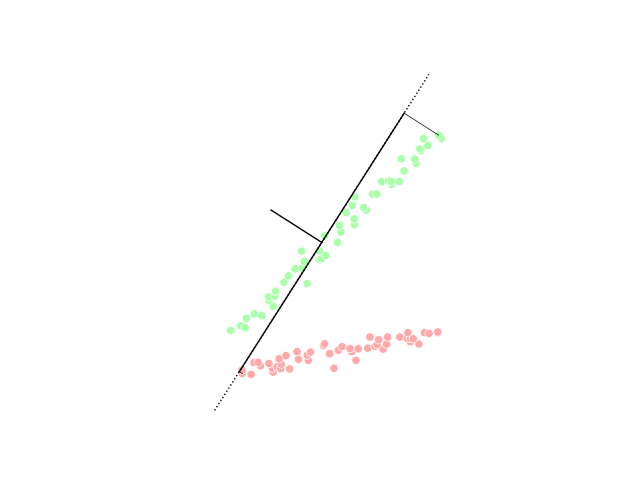|
Latent And Observable Variables
In statistics, latent variables (from Latin: present participle of ) are variables that can only be inferred indirectly through a mathematical model from other observable variables that can be directly observed or measured. Such '' latent variable models'' are used in many disciplines, including engineering, medicine, ecology, physics, machine learning/artificial intelligence, natural language processing, bioinformatics, chemometrics, demography, economics, management, political science, psychology and the social sciences. Latent variables may correspond to aspects of physical reality. These could in principle be measured, but may not be for practical reasons. Among the earliest expressions of this idea is Francis Bacon's polemic the ''Novum Organum'', itself a challenge to the more traditional logic expressed in Aristotle's Organon: In this situation, the term ''hidden variables'' is commonly used, reflecting the fact that the variables are meaningful, but not observable. ... [...More Info...] [...Related Items...] OR: [Wikipedia] [Google] [Baidu] |
Statistics
Statistics (from German language, German: ', "description of a State (polity), state, a country") is the discipline that concerns the collection, organization, analysis, interpretation, and presentation of data. In applying statistics to a scientific, industrial, or social problem, it is conventional to begin with a statistical population or a statistical model to be studied. Populations can be diverse groups of people or objects such as "all people living in a country" or "every atom composing a crystal". Statistics deals with every aspect of data, including the planning of data collection in terms of the design of statistical survey, surveys and experimental design, experiments. When census data (comprising every member of the target population) cannot be collected, statisticians collect data by developing specific experiment designs and survey sample (statistics), samples. Representative sampling assures that inferences and conclusions can reasonably extend from the sample ... [...More Info...] [...Related Items...] OR: [Wikipedia] [Google] [Baidu] |
Chemometrics
Chemometrics is the science of extracting information from chemical systems by data-driven means. Chemometrics is inherently interdisciplinary, using methods frequently employed in core data-analytic disciplines such as multivariate statistics, applied mathematics, and computer science, in order to address problems in chemistry, biochemistry, medicine, biology and chemical engineering. In this way, it mirrors other interdisciplinary fields, such as psychometrics and econometrics. Background Chemometrics is applied to solve both descriptive and predictive problems in experimental natural sciences, especially in chemistry. In descriptive applications, properties of chemical systems are modeled with the intent of learning the underlying relationships and structure of the system (i.e., model understanding and identification). In predictive applications, properties of chemical systems are modeled with the intent of predicting new properties or behavior of interest. In both cases, t ... [...More Info...] [...Related Items...] OR: [Wikipedia] [Google] [Baidu] |
Dimensionality Reduction
Dimensionality reduction, or dimension reduction, is the transformation of data from a high-dimensional space into a low-dimensional space so that the low-dimensional representation retains some meaningful properties of the original data, ideally close to its intrinsic dimension. Working in high-dimensional spaces can be undesirable for many reasons; raw data are often sparse as a consequence of the curse of dimensionality, and analyzing the data is usually computationally intractable. Dimensionality reduction is common in fields that deal with large numbers of observations and/or large numbers of variables, such as signal processing, speech recognition, neuroinformatics, and bioinformatics. Methods are commonly divided into linear and nonlinear approaches. Linear approaches can be further divided into feature selection and feature extraction. Dimensionality reduction can be used for noise reduction, data visualization, cluster analysis, or as an intermediate step to facilitat ... [...More Info...] [...Related Items...] OR: [Wikipedia] [Google] [Baidu] |
Organon
The ''Organon'' (, meaning "instrument, tool, organ") is the standard collection of Aristotle's six works on logical analysis and dialectic. The name ''Organon'' was given by Aristotle's followers, the Peripatetics, who maintained against the Stoics that Logic was "an instrument" of Philosophy. Aristotle never uses the title ''Organon'' to refer to his logical works. The book, according to M. Barthélemy St. Hilaire, was not called "Organon" before the 15th century, and the treatises were collected into one volume, as is supposed, about the time of Andronicus of Rhodes; and it was translated into Latin by Boethius about the 6th century. The six works of Organon are as follows: Constitution of the texts The order of the works is not chronological (which is now hard to determine) but was deliberately chosen by Theophrastus to constitute a well-structured system. Indeed, parts of them seem to be a scheme of a lecture on logic. The arrangement of the works was made by ... [...More Info...] [...Related Items...] OR: [Wikipedia] [Google] [Baidu] |
Aristotle
Aristotle (; 384–322 BC) was an Ancient Greek philosophy, Ancient Greek philosopher and polymath. His writings cover a broad range of subjects spanning the natural sciences, philosophy, linguistics, economics, politics, psychology, and the arts. As the founder of the Peripatetic school of philosophy in the Lyceum (classical), Lyceum in Athens, he began the wider Aristotelianism, Aristotelian tradition that followed, which set the groundwork for the development of modern science. Little is known about Aristotle's life. He was born in the city of Stagira (ancient city), Stagira in northern Greece during the Classical Greece, Classical period. His father, Nicomachus (father of Aristotle), Nicomachus, died when Aristotle was a child, and he was brought up by a guardian. At around eighteen years old, he joined Plato's Platonic Academy, Academy in Athens and remained there until the age of thirty seven (). Shortly after Plato died, Aristotle left Athens and, at the request ... [...More Info...] [...Related Items...] OR: [Wikipedia] [Google] [Baidu] |
Novum Organum
The ''Novum Organum'', fully ''Novum Organum, sive Indicia Vera de Interpretatione Naturae'' ("New organon, or true directions concerning the interpretation of nature") or ''Instaurationis Magnae, Pars II'' ("Part II of The Great Instauration"), is a philosophical work by Francis Bacon, written in Latin and published in 1620. The title is a reference to Aristotle's work '' Organon'', which was his treatise on logic and syllogism. In ''Novum Organum'', Bacon details a new system of logic he believes to be superior to the old ways of syllogism. This is now known as the Baconian method. For Bacon, finding the essence of a thing was a simple process of reduction, and the use of inductive reasoning. In finding the cause of a 'phenomenal nature' such as heat, one must list all of the situations where heat is found. Then another list should be drawn up, listing situations that are similar to those of the first list except for the lack of heat. A third table lists situations wher ... [...More Info...] [...Related Items...] OR: [Wikipedia] [Google] [Baidu] |
Polemic
Polemic ( , ) is contentious rhetoric intended to support a specific position by forthright claims and to undermine the opposing position. The practice of such argumentation is called polemics, which are seen in arguments on controversial topics. A person who writes polemics, or speaks polemically, is called a polemicist. The word derives , . Polemics often concern questions in religion or politics. A polemical style of writing was common in Ancient Greece, as in the writings of the historian Polybius. Polemic again became common in medieval and early modern times. Since then, famous polemicists have included satirist Jonathan Swift, Italian physicist and mathematician Galileo, French theologian Jean Calvin, French Enlightenment writer, historian, and philosopher Voltaire, Russian author Leo Tolstoy, socialist philosophers Karl Marx and Friedrich Engels, novelist George Orwell, playwright George Bernard Shaw, communist revolutionary Vladimir Lenin, linguist Noam Chomsky, so ... [...More Info...] [...Related Items...] OR: [Wikipedia] [Google] [Baidu] |
Francis Bacon
Francis Bacon, 1st Viscount St Alban (; 22 January 1561 – 9 April 1626) was an English philosopher and statesman who served as Attorney General and Lord Chancellor of England under King James I. Bacon argued for the importance of natural philosophy, guided by the scientific method, and his works remained influential throughout the Scientific Revolution. Bacon has been called the father of empiricism. He argued for the possibility of scientific knowledge based only upon inductive reasoning and careful observation of events in nature. He believed that science could be achieved by the use of a sceptical and methodical approach whereby scientists aim to avoid misleading themselves. Although his most specific proposals about such a method, the Baconian method, did not have long-lasting influence, the general idea of the importance and possibility of a sceptical methodology makes Bacon one of the later founders of the scientific method. His portion of the method based in ... [...More Info...] [...Related Items...] OR: [Wikipedia] [Google] [Baidu] |
Social Sciences
Social science (often rendered in the plural as the social sciences) is one of the branches of science, devoted to the study of society, societies and the Social relation, relationships among members within those societies. The term was formerly used to refer to the field of sociology, the original "science of society", established in the 18th century. It now encompasses a wide array of additional academic disciplines, including anthropology, archaeology, economics, geography, history, linguistics, management, communication studies, psychology, culturology, and political science. The majority of Positivism, positivist social scientists use methods resembling those used in the natural sciences as tools for understanding societies, and so define science in its stricter Modern science, modern sense. Speculative social scientists, otherwise known as Antipositivism, interpretivist scientists, by contrast, may use social critique or symbolic interpretation rather than constructing Em ... [...More Info...] [...Related Items...] OR: [Wikipedia] [Google] [Baidu] |
Psychology
Psychology is the scientific study of mind and behavior. Its subject matter includes the behavior of humans and nonhumans, both consciousness, conscious and Unconscious mind, unconscious phenomena, and mental processes such as thoughts, feelings, and motivation, motives. Psychology is an academic discipline of immense scope, crossing the boundaries between the Natural science, natural and social sciences. Biological psychologists seek an understanding of the Emergence, emergent properties of brains, linking the discipline to neuroscience. As social scientists, psychologists aim to understand the behavior of individuals and groups.Hockenbury & Hockenbury. Psychology. Worth Publishers, 2010. A professional practitioner or researcher involved in the discipline is called a psychologist. Some psychologists can also be classified as Behavioural sciences, behavioral or Cognitive science, cognitive scientists. Some psychologists attempt to understand the role of mental functions in i ... [...More Info...] [...Related Items...] OR: [Wikipedia] [Google] [Baidu] |
Political Science
Political science is the scientific study of politics. It is a social science dealing with systems of governance and Power (social and political), power, and the analysis of political activities, political philosophy, political thought, political behavior, and associated constitutions and laws. Specialists in the field are political scientists. History Origin Political science is a social science dealing with systems of governance and power, and the analysis of political activities, political institutions, political thought and behavior, and associated constitutions and laws. As a social science, contemporary political science started to take shape in the latter half of the 19th century and began to separate itself from political philosophy and history. Into the late 19th century, it was still uncommon for political science to be considered a distinct field from history. The term "political science" was not always distinguished from political philosophy, and the modern dis ... [...More Info...] [...Related Items...] OR: [Wikipedia] [Google] [Baidu] |






